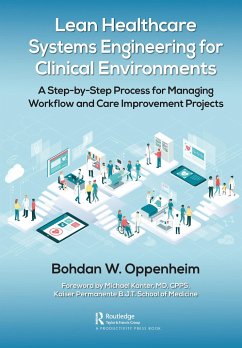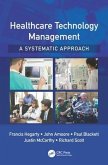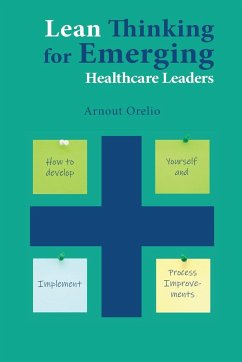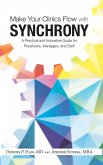It has been almost 20 years since the Institute of Medicine released the seminal report titled, Crossing the Quality Chasm. In it, the IoM identified six domains of care quality (safe, timely, effective, efficient, equitable, and patient-centric) and noted a huge gap between the current state and the desired state. Although this report received a great deal of attention, sadly there has been little progress in these areas. In the U.S., healthcare still has huge disparities, is inefficient, and is fragmented with delays in care that are often unsafe. Most U.S. citizens are expected to suffer from a diagnostic error sometime during their lifetime, not receive a large fraction of recommended care, and pay for one of the most expensive systems in the world. Much has been written about quality improvement over the years but many prominent quality and safety experts. Yet progress has been slow. Some have called on the healthcare professions to look outside of healthcare to other industries using examples in nuclear power and airlines for safety, the hotel and entertainment industry for a 'customer' focus, and the automotive industry, particularly Toyota for efficiency (Lean). This book by Dr. Oppenheim on lean healthcare systems engineering (LHSE) is a fresh approach that brings forth concepts that systems engineers have used in huge national defense projects. What's unique in this book is that these powerful system engineering tools are modified to be able to address smaller sized healthcare problems that still involve similar problems in fragmentation and poor communication and coordination. This book is an invaluable reference for a new powerful process named Lean Healthcare Systems Engineering (LHSE) for managing workflow and care improvement projects in all clinical environments. The book applies to ambulatory clinics and hospitals of all types including operating rooms, emergency departments, and ancillary departments, clinical and imaging laboratories, pharmacies, and population health. The book presents a generic rigorous but not mathematical step-by-step process of integrated healthcare, systems engineering and Lean. The book also contains the first major product created with the LHSE process, namely tabularized summaries of representative projects in healthcare delivery applications, called Lean Enablers for Healthcare Projects. Each full-page enabler table lists the challenges and wastes, powerful improvement goals, risks, and expected benefits, and some useful descriptions of the healthcare system of interest. The book provides user-friendly solutions to major problems in healthcare delivery operations in all clinical environments, addressing fragmentation, wastes, wrong incentives, ad-hoc and stove-piped management, lack of optimized processes, hierarchy gradient, lack of systems thinking, "blaming and shaming culture", burnout of providers and many others.
Hinweis: Dieser Artikel kann nur an eine deutsche Lieferadresse ausgeliefert werden.
Hinweis: Dieser Artikel kann nur an eine deutsche Lieferadresse ausgeliefert werden.
"Every day that our health care systems malfunction, there is a huge opportunity cost in terms of money, mortality, morbidity, on-going health disparities, and patient frustration. I believe that this book has a huge potential to solve many problems using less resources and less time."
Michael Kanter, MD., CPPS, Professor and Chair of Clinical Science; Kaiser Permanente Bernard J. Tyson School of Medicine; former Regional Medical Director of Quality & Clinical Analysis, Kaiser Permanente
"The American healthcare system is replete with paradoxes. The system has an abundance of resources, outstanding medical centers and extraordinarily well-trained doctors and other health care professionals. Yes, despite the high costs the results are inconsistent resulting from waste and inefficiency. In this book Professor Oppenheim outlines the Lean Healthcare Systems Engineering methodology which, properly implemented can reduce waste and create a more reliable healthcare system. With this methodology the future for American healthcare is bright. Brilliant!"
Howard Fullman, MD, FACP, GACG, AGAF, Medical Director and Chief of Staff Emeritus, Kaiser Permanente, West Los Angeles
"The very complex and fragmented US healthcare system continues to challenge us to meet the needs of patients and providers for care that is affordable and of consistent high quality. Dr. Oppenheim's book on Lean Healthcare Systems Engineering (LHSE) offers a straightforward rigorously applied methodology that serves as a very effective approach toward achieving measurable and impactful improvements in the efficiency and quality of care. I can confidently recommend his book based on my personal experience as a physician leader who has successfully employed LHSE and its Lean enablers to improve healthcare delivery in a variety of clinical settings."
F. Ronald Feinstein, DMD, MD, FACS, Clinical Professor of Surgery Keck School of Medicine of USC; Assistant Area Medical Director and Physician Manager Surgical and Support Services Emeritus Kaiser-WLA; Regional Chief of Plastic Surgery Emeritus Southern California Permanente Medical Group
"The book and author's thoughtful and robust insights are the perfect prescription for anyone with a serious desire to remedy the complex, fragmented, and broken healthcare delivery system. The technical details and real-life examples provide a much needed road map for the journey from theory to actual and attainable, practical improvement."
Gail Lindsay, RN, MA, SCAL Region Chief Quality Officer, Providence St. Joseph
"Based on my own experience, both as a practicing Chief of Pediatrics and as an Assistant Area Medical Director responsible for Quality Improvement, this is a very readable, yet thorough work grounded in the reality of actually improving medical care. A groundbreaking contribution to the field. Masterful."
Stephen Tarzynski, MD., MPH, Kaiser Permanente, President of California Physicians Alliance (CaPA).
"This book supplies a roadmap for anyone interested in taking the best aspects of systems engineering and lean thinking and applying them in a pragmatic way to healthcare delivery. It is understandable by everyone, but valuable even to experienced practitioners."
Christopher Unger, Ph.D., INCOSE Healthcare Working Group Leader
Chief Systems Engineer, GE Healthcare
"The application of systems engineering and lean processes to the healthcare industry is an important enabler to the INCOSE vision of "a better world through a systems approach." This text describes a new process Lean Healthcare Systems Engineering (LHSE) for managing workflow and care improvement projects in clinical environments. Following the step-by-step process identified in this text can contribute to higher quality of project work and project results with fewer frustrations, I encourage readers to give it a try!"
Marilee J. Wheaton, President-Elect and Fellow, International Council for Systems Engineering (INCOSE), Systems Engineering Fellow, The Aerospace Corporation
"More now than ever with the pandemic the Lean Healthcare System Engineering will expeditiously address systems issues, so this book is timely."
Jamie Gearon, Chief, Process Improvement Office, VA Greater Los Angeles Healthcare System
"I train/coach individuals and teams who are embedded in healthcare provider organisations directly. I would recommend this book to my apprentices as a valuable complementary perspective from someone who has seen it, done it and is teaching it."
Dr. S. R. Dodds MA, MS, FRCS. Health Care Systems Engineer and Consultant Surgeon, United Kingdom
"Professor Oppenheim's treatment of LHSE is groundbreaking. Given the significant degree of fragmentation in the US Healthcare System his LHSE methodology is exactly what is needed to improve outcomes with the limited resources available. Students of his methodology will help lead the American healthcare quality revolution which is still badly needed."
Howard Fullman, Area Medical Director, Kaiser Permanente.
Michael Kanter, MD., CPPS, Professor and Chair of Clinical Science; Kaiser Permanente Bernard J. Tyson School of Medicine; former Regional Medical Director of Quality & Clinical Analysis, Kaiser Permanente
"The American healthcare system is replete with paradoxes. The system has an abundance of resources, outstanding medical centers and extraordinarily well-trained doctors and other health care professionals. Yes, despite the high costs the results are inconsistent resulting from waste and inefficiency. In this book Professor Oppenheim outlines the Lean Healthcare Systems Engineering methodology which, properly implemented can reduce waste and create a more reliable healthcare system. With this methodology the future for American healthcare is bright. Brilliant!"
Howard Fullman, MD, FACP, GACG, AGAF, Medical Director and Chief of Staff Emeritus, Kaiser Permanente, West Los Angeles
"The very complex and fragmented US healthcare system continues to challenge us to meet the needs of patients and providers for care that is affordable and of consistent high quality. Dr. Oppenheim's book on Lean Healthcare Systems Engineering (LHSE) offers a straightforward rigorously applied methodology that serves as a very effective approach toward achieving measurable and impactful improvements in the efficiency and quality of care. I can confidently recommend his book based on my personal experience as a physician leader who has successfully employed LHSE and its Lean enablers to improve healthcare delivery in a variety of clinical settings."
F. Ronald Feinstein, DMD, MD, FACS, Clinical Professor of Surgery Keck School of Medicine of USC; Assistant Area Medical Director and Physician Manager Surgical and Support Services Emeritus Kaiser-WLA; Regional Chief of Plastic Surgery Emeritus Southern California Permanente Medical Group
"The book and author's thoughtful and robust insights are the perfect prescription for anyone with a serious desire to remedy the complex, fragmented, and broken healthcare delivery system. The technical details and real-life examples provide a much needed road map for the journey from theory to actual and attainable, practical improvement."
Gail Lindsay, RN, MA, SCAL Region Chief Quality Officer, Providence St. Joseph
"Based on my own experience, both as a practicing Chief of Pediatrics and as an Assistant Area Medical Director responsible for Quality Improvement, this is a very readable, yet thorough work grounded in the reality of actually improving medical care. A groundbreaking contribution to the field. Masterful."
Stephen Tarzynski, MD., MPH, Kaiser Permanente, President of California Physicians Alliance (CaPA).
"This book supplies a roadmap for anyone interested in taking the best aspects of systems engineering and lean thinking and applying them in a pragmatic way to healthcare delivery. It is understandable by everyone, but valuable even to experienced practitioners."
Christopher Unger, Ph.D., INCOSE Healthcare Working Group Leader
Chief Systems Engineer, GE Healthcare
"The application of systems engineering and lean processes to the healthcare industry is an important enabler to the INCOSE vision of "a better world through a systems approach." This text describes a new process Lean Healthcare Systems Engineering (LHSE) for managing workflow and care improvement projects in clinical environments. Following the step-by-step process identified in this text can contribute to higher quality of project work and project results with fewer frustrations, I encourage readers to give it a try!"
Marilee J. Wheaton, President-Elect and Fellow, International Council for Systems Engineering (INCOSE), Systems Engineering Fellow, The Aerospace Corporation
"More now than ever with the pandemic the Lean Healthcare System Engineering will expeditiously address systems issues, so this book is timely."
Jamie Gearon, Chief, Process Improvement Office, VA Greater Los Angeles Healthcare System
"I train/coach individuals and teams who are embedded in healthcare provider organisations directly. I would recommend this book to my apprentices as a valuable complementary perspective from someone who has seen it, done it and is teaching it."
Dr. S. R. Dodds MA, MS, FRCS. Health Care Systems Engineer and Consultant Surgeon, United Kingdom
"Professor Oppenheim's treatment of LHSE is groundbreaking. Given the significant degree of fragmentation in the US Healthcare System his LHSE methodology is exactly what is needed to improve outcomes with the limited resources available. Students of his methodology will help lead the American healthcare quality revolution which is still badly needed."
Howard Fullman, Area Medical Director, Kaiser Permanente.








